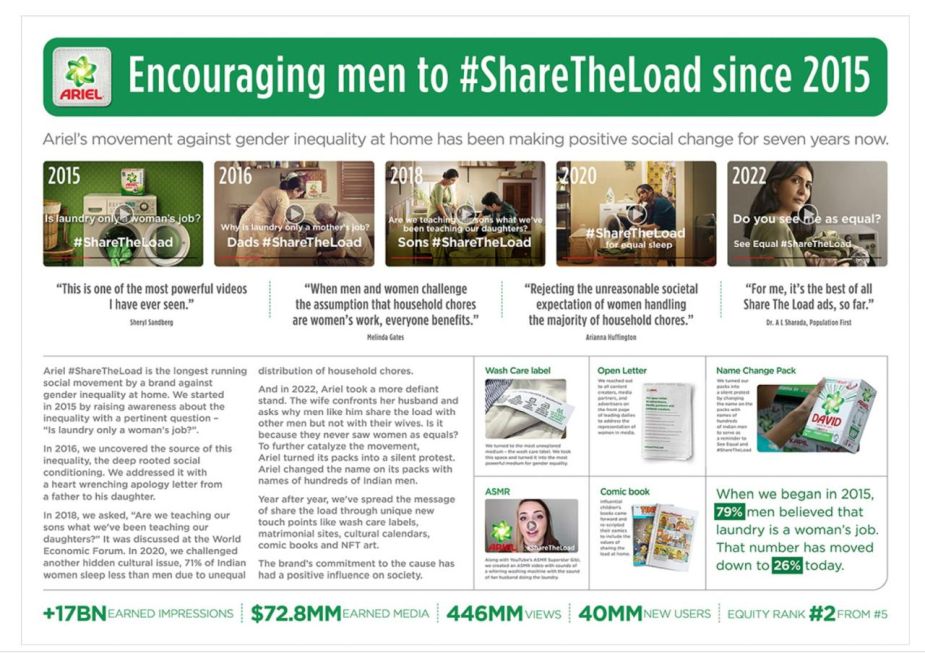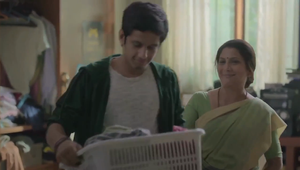
The Radical Empathy of #ShareTheLoad Goes Way Beyond Who Does the Laundry

“For me, this is not advertising. This is some sort of cosmic learning programme.”
‘#ShareTheLoad’ is one of those ideas that’s so much more than an advertising campaign. For, Josy Paul, the chairman at BBDO India, the long-running platform for P&G laundry brand Ariel that’s first launched in 2015, has been a nexus change. It’s changed hearts and minds across India. It’s changed the very culture of the agency. And it’s changed him.
The brand platform is a mainstay of the Indian advertising calendar, every year finding new ways to entreat men to shoulder some of the burdens of household chores carried by the busy and exhausted women in their lives. It’s an idea that’s not only resonated locally, but globally, pioneering purposeful advertising across the industry. The initial campaign launched in 2015, with an emotional brand film and a clever activation that added ‘can be washed by both men and women’ to wash care labels. That launch netted a Glass Lion (just a year after BBDO India won the inaugural Glass Lion Grand Prix for Whisper’s ‘Touch the Pickle’), and has since gone from strength to strength. There have been poignant films looking at how partners, sons and fathers can do their share - and there have been ingenious activations and media hacks, from messaging on care instruction labels to comic books and ASMR videos.
For a campaign that’s had such resonance and has tapped into a deep social inequity, the original brief that kicked it all off was surprisingly prosaic. To make the brand more relevant to and grab the attention of urban women, after Ariel’s competitor, Surf started to steal a march on coverage and conversation with their ‘Dirt is Good’ platform.
The creative origins of Share the Load are the stuff of alchemy, that mix of magic and science. On the magic side, the agency uses what Josy calls ‘creative therapy sessions’, where people can come in, and vent about what’s bothering them. What often happens in these safe spaces is that people feel freer and more comfortable with their vulnerability - and end up dredging up unexpected nuggets from their unconscious. These vents can be about anything, professional, personal, existential… and even frustrations about housework.
Those conversations can shake loose all sorts of surprising questions and provocations. “I don't know what made me ask that question: Why is laundry only a woman service?” Probably there is an inherent energy of dissent or disobedience, which exists in the agency. A lot of our work tends to question the status quo and question authority. We keep saying, it's not about the idea of authority, but about the authority of ideas.”
A few days after one creative therapy session a planner approached Josy with a report they’d unearthed, revealing that in India, men do on average 19 minutes of housework a day while women do five hours.
“The moment we saw that, it just hit us. Sometimes you do need that sort of cold data to hit you, right? And yet, it's coming from a very emotional base, which is why we were doing our conversations.”
Having asked the question and armed themselves with some hard facts, the team could have gone in all sorts of directions with the execution. Cheeky. Confrontational. Solemn. Instead, they’ve created a world of empathetic and sensitively drawn stories that don’t seek to judge the men they portray. As Josy explains, they understood that the campaign would have to foster a sense of realisation, both in the tone they used and the relatable stories drawn from real life.
“We keep that in mind all the time. We don't want the defences coming up. We want people to shed the defence and have a certain acceptance, so we try to make it a story where everyone says, ‘Yeah, that's me’,” explains Josy.
As creatives, they’d have to be open to receiving those insights and stories from people - and hopefully, in turn, men in the audience would feel open to the message.
“That's how all of our work is. It's a combination of the universal and the personal and somewhere they meet.”
The usual challenges of getting the first iteration of a new brand platform off the ground were made infinitely easier to navigate thanks to Sharat Verma, the CMO of P&G India. They’d previously worked together on a social movement campaign, albeit on a smaller scale than #SharetheLoad, a Gillette campaign called ‘Women Against Lazy Stubble’. That went on to win the inaugural Creative Effectiveness Lion in 2011 and proved that movements could mean good business.
“I think these things are important to understand each other and accept that maybe all of us bring our own little ‘X factor’ to it,” says Josy. “When we came up with this thought, he [Sharat] felt it too. It's just this vibe, it's a chemistry thing. It's very difficult to explain when you're sitting in a room with three or four people who want to create the same kind of music and know that you've done it before.”
Keeping the stories fresh and relevant every year means lots and lots of listening. There’s no convoluted process. “It's the most retro process, which is you have to be an antenna, you have to be constantly receiving with no bias,” says Josy.
The team are constantly out there listening to friends and family. College students are invited to share their stories. People come together in these creative therapy sessions where, Josy says, it’s not uncommon for someone to shed tears as they share the experiences of their cousins, parents, or neighbours. As the stories come in, the team starts to formulate little hypotheses which P&G test with a wider audience to make sure that their hunches are true. It’s a creative practice rooted in sincerity.
“The starting point is what I call emotional archaeology. It’s really digging deep, because it already exists. We don't want to manufacture anything. And that's the feeling - these topics are, so precious, that you cannot allow [the feeling of] ‘I want to be cool and clever to come in the way’,” says Josy. “ I'm not saying we can't be called clever on something else. But when we're doing this, it's purity.”
There’s a fluidity and openness to the creative practice of the annual #ShareTheLoad campaigns, whereby people can come in, share if they want to and go off to do something else.
Josy lights up when he reflects on the perfect example of this open and fluid set. Three years ago, the #ShareTheLoad campaign focused on the concept of equal sleep, looking at how the stress and mental load of bearing the sole responsibility for household chores was affecting womens’ sleep. “One of the young ladies in our office came and said, ‘You know, I sleep less, because I have to think about what I have to get in the morning, so I'm constantly getting up writing stuff’. So that led us to that idea - and so that's why I said sometimes, in the personal, is the universal.”
Last year’s campaign landed upon the insight that men often see helping other men with chores as second nature, whether they’re siblings, friends, roommates or partners - but often have a blindspot when it comes to women.
The latest campaign features an older couple who have grown distant from each other, and their concerned daughter who confronts her father about the way his lack of household support is pushing his wife away. It’s a story that crosses generations at a time of intergenerational conflict. Again, in the development of the campaign, the team unearthed some fascinating insights - this time into interconnected tensions having an impact on older and younger people.
“We started seeing two things in our listening. One was what we call silver divorces. We saw silver divorces were on the rise, and that people after 25 or 30 years were parting ways. Like 'I've had enough now, I've got my own things to do, thank you, it was beautiful, goodbye’. So we were seeing that and we were also seeing and listening to gen z, who were now speaking up about it.
Gen z's were seeing it and they were feeling inadequate to speak up at home. They were speaking up about everything else. They had a point of view about changing the world, but they were not able to change things in their own home, when it came to the relationships they’re seeing at home. So we fell somewhere,” says Josy. “This is a new story for us, you know, to see whether we can offer some solution.”
And what about the wider social change? Well while it’s hard to pinpoint behavioural change, it seems attitudes have been transformed. Back in 2015, Josy says that 79% of men in India felt that laundry is only a women’s job, whereas today that number is down to 26%. In 2022, they had found that the platform has clocked up over 17 billion earned views and the brand's Equity Rank has jumped from number five to number two.

Thinking back to the original brief - to sell more Ariel to urban women - the brand and agency now have a far broader and all-inclusive view of who their consumer is. Last year, they launched packaging named after 100 different men’s names, to hammer that point home. “In a way, while we may have started off with talking to women, it's now touching everyone and everyone's involved.”
Since the first #ShareTheLoad campaign came out in 2015, it’s fair to say that the agency has been on a real creative journey. The nature of the creative process has also started to shape the culture of the agency itself, as people phase in and out of the campaign’s orbit. The spirit of the campaign seems to touch all who pass through.
“A lot of people come to us saying, can we just be with you for just this year, I just want to touch this campaign,” reveals Josy. “It's like people want to wash away their sins in the Ganges of Share the Load.”
And it’s clearly had a deeply personal impact on Josy himself and his whole conception of creativity.
“My definition of creativity also began to change. It's not that I don't believe in what I believed before. When I started out, I would say that creativity is about connecting two different things. I was a physics graduate, and I would say, ‘Man, you throw me two things, I'll show you how they connect, I believe in the interconnectedness of everything’. And then, the fun would happen when you take two things and make them connect. And there was some cleverness about it. But it was also very cool.
“Over time, because of t the work that we did with Share the Load, and ‘Touch the Pickle’ and other such pieces, I began to see creativity as one more thing too… as sensitivity in a world where no one is listening. And for me, that forced me to understand what it means to listen. So in a way, there's a little bit of healing and all this, for me personally, and for the team was part of it.”













